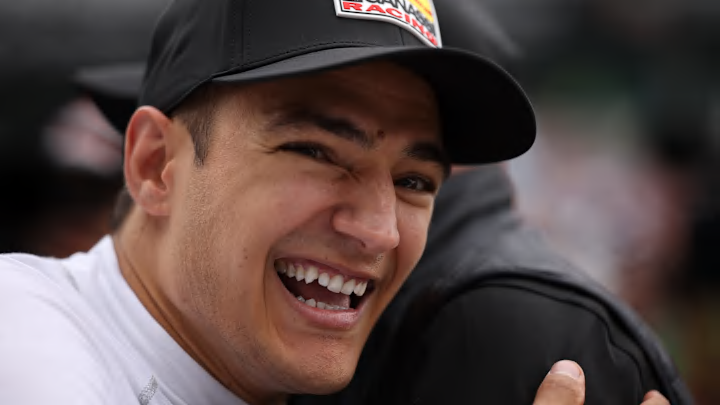That’s right; the best IndyCar driver the series has seen in decades statistically might very well be damaging the product. Indirectly, of course.
Alex Palou is just too good.
And that could be a problem for a North American open-wheel series looking to compete with its international counterpart, Formula 1.
While Palou is having an IndyCar campaign to rival one of Max Verstappen’s recent dominant F1 seasons, fans tune in there for more than racing – glitz, glamor, and global appeal.
That’s something that IndyCar doesn’t have. It’s generally known as a Midwest series looking to branch out beyond those cities into larger markets in North America, and hopefully internationally with stars like Spain’s Palou and current runner-up driver in the standings, Pato O’Ward, of Mexico.
The final stretch! @INDYCAR hits its last road course of the season this weekend at Portland International Raceway, with @AlexPalou looking to clinch the championship. Tune in to @INDYCARonFOX for complete coverage! pic.twitter.com/7gkebI7bgA
— FOX Sports PR (@FOXSportsPR) August 7, 2025
Palou and O’Ward are accomplishing some success in spreading the word in their home countries, but Palou has taken the proverbial air out of the series, as the championship can be clinched this weekend in Portland with three races left to go on the calendar.
Palou is poised to tie Sebastien Bourdais as the second driver to reach a fourth IndyCar championship by age 28. In the process, he is set to tie legends Mario Andretti and Dario Franchitti for third on all-time title list, behind fellow greats A.J. Foyt and Scott Dixon.
Many drivers have described Palou’s 2025 season from their perspective as “frustrating", because no matter where he starts on race day, he always seems to come out on top.
Take for example the most recent round in Monterey. O’Ward fell from second to fourth in the race and it essentially ended his chasing of Palou for the crown. Palou, who won the pole, simply toyed with the field on the way to victory. He wound up leading 84 of 95 laps and earned the most points with his eighth victory of the year. Now, 121 points separate the two.
So how could Palou really be so damaging to IndyCar?
Ratings. The 28-year-old Palou is set to claim his fourth crown faster than any of the drivers with four or more, except Bourdais, who also was 28 when he won the 2007 Champ Car title. You can make a serious case this is the greatest individual season in the sport’s history. Palou could very well win nine, 10, or even 11 races to make even more history.
Yet his achievements have finally taken something away that IndyCar always prided itself on: parity. While he has already won back-to-back championships, he’s never done it in such a dominant fashion. And that begs this question: will fans want to see history be made, or is the lack of competition, especially in a series that relies so heavily on it, going to turn people away?
Foyt, arguably the greatest IndyCar driver of all-time, was 29 when he got to title No. 4. Dixon, who is still active, earned his fourth title at age 35 and his sixth and most recent at 40. Franchitti got to No. 4 as a 38-year-old in 2011 and Andretti was 44 in 1984, the last time he captured the title.
To add some context, Palou had won eight races coming into the season since 2022: one win that year, five in 2023, and two last year in his third championship campaign. He’s always been consistent, but the wins didn’t always come with that, allowing the race for the Astor Challenge Cup to hang in the balance and keep fans guessing and watching.
Palou has made 95 career starts in the series and has now won in 20% of them. He has stood on the podium a ridiculous 43.16% of the time. He is as close to a sure thing in racing as there is.
Which is why history isn’t out of the question with three races to go. The record for IndyCar wins in a season is 10 (A.J. Foyt, 1964 and Al Unser, 1970).
"Honestly, I would not trade our points for anybody," said Palou, addressing the media following his win at Laguna Seca. "I would not trade our position, and I would not ask for anything more or anything less. But, yeah, it's not done until it's done. We still need to win it. We still need to keep our heads down and try to win more races."
INDYCAR Championship Format Works Just Fine, Despite Alex Palou's Dominance @IndyCarOnFOX https://t.co/y90VPiSqVA
— Bob Pockrass (@bobpockrass) August 6, 2025
Winning is great for Palou and fans of Palou, but it still could be bad for business for IndyCar, even if it's out of its control. Dominance in sports happens, right? Just don't expect anyone but the diehards to watch.
IndyCar now has seen six consecutive races that failed to reach an average audience of 800,000 fans. Everyone tunes into the Indy 500 (yeah, Palou won that this year, too, for the first time in his career). The other races, not always so much, even if the average audience has stabilized during this most recent stretch, typically in the 700,000-plus range.
Who would have thought the best thing to happen to IndyCar in a long time might be the worst thing to happen to IndyCar in a long time?
I suppose that’s what happens when you are in a league of your own. Cheers to Alex Palou on another championship, whether that comes this weekend in the Pacific Northwest or in Wisconsin or Nashville over the final two weeks of August.
